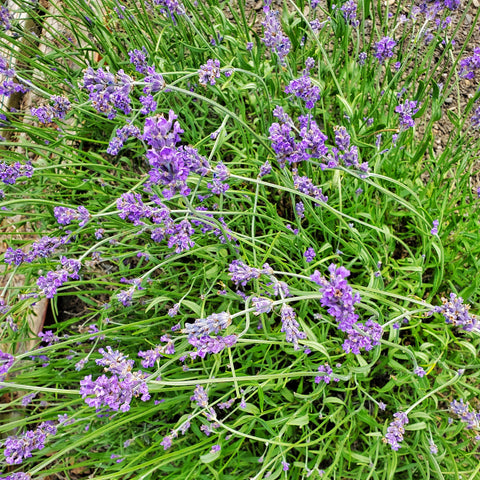Lavender is easily one of my favorite scents. It imparts a feeling of calm and softness upon catching its scent in the air. Smelling it's scent drifting in the breeze as I walk to my greenhouse always brightens my day. This calming beauty has long been known to treat many ailments and has been used in aromatherapy for thousands of years. Join us to explore the history and uses of this wonderful plant!

Uses of lavender date back thousand of years, about 2500 years to be exact. It is possible that it could have been used even earlier than that, but we have yet to uncover record of it. Lavender was commonly known as "nard" by the Greeks or noted as "spikenard" in the Bible. It is mentioned in several places, including the Song of Solomon. The name lavender itself is derived from a Latin word "lavare" which means wash in English. During Roman times, it is noted that people of nobility used the herb in baths, as a perfume, and medicinally. As you can see, this plant has been long revered for its wonderful qualities and calming scent.
Lavender oil obtained during the extraction process possesses many scientifically proven medicinal qualities. The oil is: antibacterial, analgesic, anti-inflammatory, antifungal, antispasmodic, cicatrisant, an immunostimulant, and so much more! Lavender is also a well known central nervous system sedative, renowned for its calming qualities.
Linalyl acetate and Linalool are the two chemical components present in lavender that have been scientifically proven to reduce anxious feelings! (See: Itai et al. 2000, Shen et al. 2005b, Hwang 2006, Shen et al. 2007, Field et al. 2008, Toda et al. 2008, Hoya et al. 2008, Linck et al. 2009, Woelk and Schläfke 2010). Don't let anyone tell you that aromatherapy and essential oils are snake oil. Many essential oils have shown in studies to have a wide variety of medicinal qualities. Let's not forget, herbal remedies were the original form of medicine!
Aside from its ability to calm anxious feelings, lavender is wonderful to treat cuts, scrapes or burns. It can reduce inflammation, prevent infection, numb the area, and promote healing. Lavender is actually one of the only essential oils that I recommend using neat for acute issues. If I get stung or burned, I immediately put a drop of lavender on the area and it feels SO much better.
As you can see, lavender goes much deeper than its beautiful outward appearance and lovely fragrance. What is your favorite use for lavender? Comment below! We would love to hear from you.
Try It:
Stress Be Gone Aromatherapy Roll-on


Help Me Heal Herbal Healing Salve
Keep Me Fresh Natural Deodorant
Soothe Me Body Butter

You can purchase her organic aromatherapy goods at www.apothepurity.com




